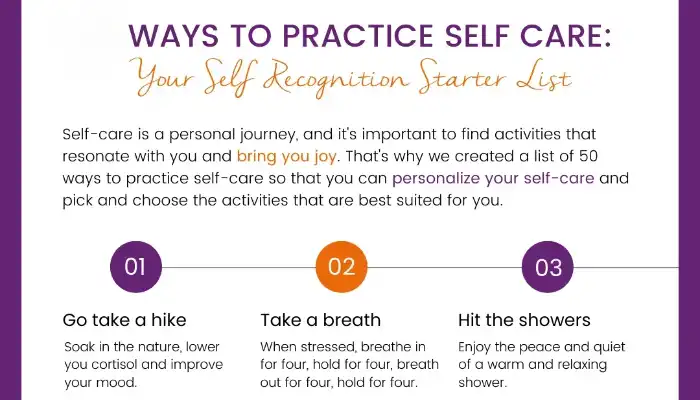Think of yourself as an orchestra. The physical, emotional, mental, and social sections play very important roles in creating a symphony of well-being that is so beautiful. This means, therefore, that self-care could be symbolized as the conductor who ensures each of these parts harmonizes with the rest to give a fulfilling and enriching life.
Beyond pampering with face masks and spa treatments (which are fun, of course), self-care involves holistic well-being that attends to the whole individual—body, mind, feelings, and relationships. If you make yourself a priority, you will be establishing an unshakable foundation on which to live a healthy life with happiness, poise, and flexibility during hard times.

Let us go into detail on what the different instruments in this self-care orchestra mean:
The Proper Instrument Tuning for The Physical
Physical health serves as the underlying infrastructure for well-being. When our bodies are comfortable, we feel mentally and emotionally good. Some ways to strengthen your physical instrument include:
Physical Activity is Fun:
Let’s change the way we think about exercise. Instead of thinking of it as an obligation, take pleasure in its presence in our day. Do not see it as a task to be ticked off, but rather enjoy doing it for your health’s sake. Try and organize at least 30 minutes of physical activity into your daily timetable; remember, though, that this does not have to be intense.
Rather, concentrate on things you enjoy doing and that make you feel good. Discover any activities you genuinely like—walking, dancing, cycling, or playing different games. The main thing is to make exercise a pleasurable experience rather than something that has to be done. You can change the way you think about exercise so that you start having healthier and more permanent ways of keeping fit.
Give Your Body What It Wants:
Eating healthy can be fun without being too restrictive. When it comes to self-care, there’s no single food that suits everyone. It all revolves around including a wide range of nutrient-dense foods in your meals.
Such as getting abundant colors of fruits and vegetables, choosing whole grains that contain fiber, or selecting lean protein options like fish and chicken. Moreover, stay away from highly processed snacks such as chips and soda since they are loaded with unhealthy fats that may make you feel exhausted and lazy.
Rest & Recharge:
It has been said that sleep is essential for mental rejuvenation, let alone physical ones too. Strive to acquire 7-8 hours of sound sleep each night.
Keep Hydrated:
The most important way to keep your body in excellent condition is by staying hydrated. It could be as simple as using a refillable water bottle whenever you move around. This helps you recall drinking sufficiently throughout the day.
Consequently, by so doing, it supports one’s digestive system, enhances nutrient absorption abilities, and fosters the excretion of waste materials from the body. Don’t wait till you are parched; sip away! Always keep that h2o going and enjoy maximum gains!
Factor in Health Checkups:
Prevention is better than cure; this is an adage that suits this phrase best. Visit your doctor every year for check-ups and screenings, too.
Harmonizing the Emotional Instrument: Identifying & Processing Your Emotions
Emotions are what make us human first and foremost; if we refuse or hide them, then it can lead to a buildup of negativity. Below are ways to encourage emotional well-being:
- Feel Your Feelings: Sadness, anger, frustration, and overwhelm are emotions that one would agree make us human beings. Experience their depth without any judgment of yourself.
- Talk it Out: Share with a trustworthy person in your life how you feel about things. Writing can also assist a lot when processing feelings.
- Healthy Boundary Setting: Establishing limits involves knowing your limits and having no problem with saying “no” to activities which can drain your emotional strength. It’s ok to take care of oneself in a relationship by giving time to the ones that make you feel better rather than spending it on those who sap energy from you. Our emotional well-being is protected as we define ‘what’ is and ‘what’ is not in terms of our personal boundaries.
- Mindfulness and Meditation: Mindfulness and meditation are comparable to calm anchors in life, which are full of challenges. This makes them great techniques that can assist us in handling stress, knowing our feelings deeply, and getting inner peace. One extraordinary thing is that only taking a few deep breaths or being quiet for a few seconds can do miracles for us and make us brave enough to be weak and take on each day’s problems with less difficulty and higher self-assurance.
Sharpening the Mental Instrument: Stimulating and Relaxing the Mind
Mental stimulation is essential for cognitive functioning, creativity, and overall well-being. Remember not to forget to schedule relaxation time! Here’s how to keep your mental instrument sharp:
- Challenge Your Brain: Read books on different subjects and articles; learn languages; play musical instruments; or try some other skills.
- Engage in Creative Activities: Be it painting, writing, or playing music, irrespective, do not stop yourself from exploring what lies within you.
- Take Breaks and Holidays: Allocate breaks during your day for destressing and recharging. Go for vacations to be out of routine.
- Be Kind to Yourself by Talking Positively: Face negative thoughts by replacing them with affirmations, boosting self-confidence and appreciation.
Connecting the Social Instrument: Forming Strong Relationships
a. Support the Healthy Relationships You Have: Organize some quality time with your friends, family members, and loved ones. Involve yourself in meaningful talks and assist whenever necessary. For instance, these connections are very crucial to your emotional health.
b. Increase Your Social Network: Go out there and start interacting with new people! Participate in clubs, join volunteer teams, or even enroll in classes where you can meet those who share the same interests as yours. A diverse social network will bring different perspectives to your life.
c. Healthy Relationship Boundary Setting: People usually believe that setting boundaries in relationships leads to fostering healthy connections. Even though some people might have doubts concerning this, it should be noted that drawing lines is very important when nurturing positive and fulfilling relationships.
You establish an atmosphere suitable for development and joy by surrounding yourself with individuals who motivate and bring light into your life. Understanding and expressing your limits well can help you maintain peace and respect within your relationships.
d. Don’t Be Afraid of Declining: Sometimes, invitations or requests that drain you of energy or go against what you want have to be dismissed politely but firmly. A few meaningful interactions are better than many shallow ones.
Always remember this when deciding whether to say no or yes. ”Just as much as you need wallets without money.” When necessary, reject anything that doesn’t take you closer to what matters most in your life.
Conclusion
Self-care should be part of us throughout our lives, not just at some point. As we navigate through life’s ups and downs, it’s important to adjust our self-care routines accordingly. Start with new aspects and see which one suits you best, then modify it accordingly, adjusting accordingly till it becomes second nature.
Remember, by prioritizing wellness in all its forms, you make for yourself a life of balance, meaning, and happiness. Shape your well-being as the conductor of your own life’s symphony, because now go forth and give us an idea of what it feels like to be alive! Celebrate your freedom to steer well-being in the directions you choose.
